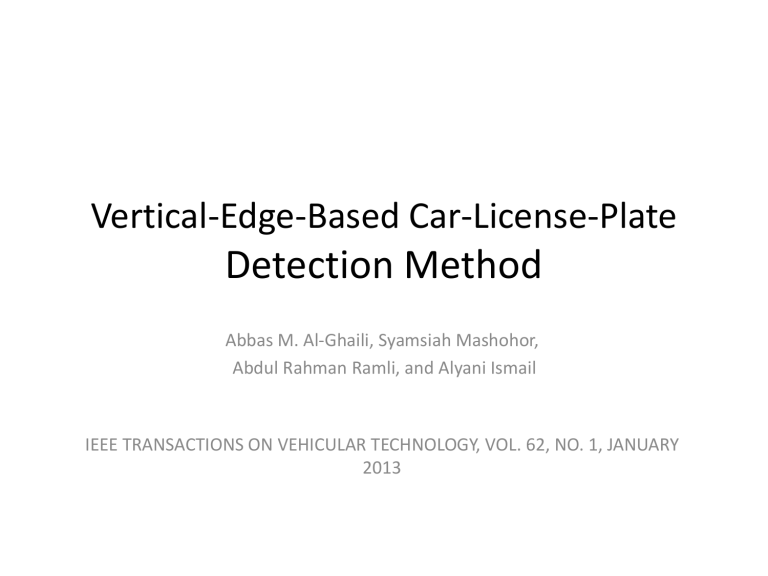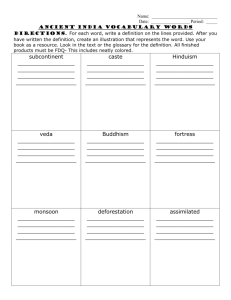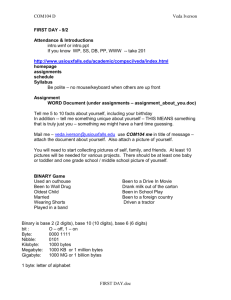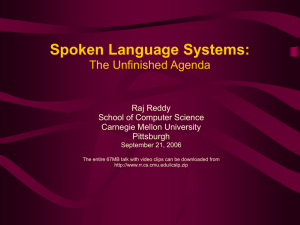Vertical-Edge-Based Car-License

Vertical-Edge-Based Car-License-Plate
Detection Method
Abbas M. Al-Ghaili, Syamsiah Mashohor,
Abdul Rahman Ramli, and Alyani Ismail
IEEE TRANSACTIONS ON VEHICULAR TECHNOLOGY, VOL. 62, NO. 1, JANUARY
2013
Outline
• Introduction
• Related Work
• Proposed method
– Overview
– AT
– ULEA
– VEDA
– HDDs based on VEDA
– CRE
– PRS
• Experiment Result and Discussion
Outline
• Introduction
• Related Work
• Proposed method
– Overview
– AT
– ULEA
– VEDA
– HDDs based on VEDA
– CRE
– PRS
• Experiment Result and Discussion
Introduction
• The car-license-plate (CLP) recognition system is an image processing technology used to identify vehicles by capturing their CLPs .
• Usually, a Car License Plate Detection and Recognition
System consists of three parts: license-plate detection
(LPD) , character segmentation , and character recognition
• Among these, LPD is the most important part in the system because it affects the system’s accuracy
Introduction
• Reduce the computation time and algorithm complexity .
• Build the LP recognition system with lower cost.
Outline
• Introduction
• Related Work
• Proposed method
– Overview
– AT
– ULEA
– VEDA
– HDDs based on VEDA
– CRE
– PRS
• Experiment Result and Discussion
Related Work
• There are several LPD methods that have been used before, such as morphological operations
[10]–[12], edge extraction [13]–[18]…
[10] J.-W. Hsieh, S.-H. Yu, and Y. S. Chen, “Morphology-based license plate detection from complex scenes,” in Proc. 16th Int. Conf. Pattern Recognit., Quebec City, QC,
Canada, 2002, pp. 176–179.
[11] A. A. Lensky, J. Kang-Hyun, and V. V. Gubarev, “Vehicle license plate detection using local fractal dimension and morphological analysis,” in Proc. IEEE 1st Int. Forum
Strategic Technol., Ulsan, Korea, 2006, pp. 47–50.
[12] F. Martin, O. Martin, M. García, and J. L. Alba, “New methods for automatic reading of VLP’s (Vehicle License Plates),” in Proc. IASTED Int. Conf. Signal Process.
Pattern Recognit. Appl., Heraklion, Greece, 2002, pp. 126–131.
[13] S.-H. Le, Y.-S. Seok, and E.-J. Lee, “Multi-national integrated car-license plate recognition system using geometrical feature and hybrid pattern vector,” in Proc. Int. Tech. Conf. Circuits Syst. Comput. Commun., Phuket,
Thailand, 2002, pp. 1256–1259.
[14] J. R. Parker and P. Federl, “An approach to license plate recognition,” in
Proc. Visual Interface, Kelowna, BC, Canada, 1997, pp. 178–182.
[15] M. Yu and Y. D. Kim, “An approach to Korean license plate recognition based on vertical edge matching,” in Proc. IEEE Int. Conf. Syst., Man,
Cybern., 2000, pp. 2975–2980.
[16] H. Zhang, W. Jia, X. He, and Q. Wu, “A fast algorithm for license plate detection in various conditions,” in Proc. IEEE Int. Conf. Syst., Man,
Cybern., Taipei, Taiwan, 2006, pp. 2420–2425.
[17] D. Zheng, Y. Zhao, and J. Wang, “An efficient method of license plate location,” Pattern Recognit. Lett., vol. 26, no. 15, pp. 2431–2438,
Nov. 2005.
[18] J.-M. Guo and Y.-F. Liu, “License plate localization and character segmentation with feedback self-learning and hybrid binarization techniques,”
IEEE Trans. Veh. Technol., vol. 57, no. 3, pp. 1417–1424,
May 2008.
Related Work
• In [28], Matas and Zimmermann proposed an algorithm to detect LPs under various conditions .
• However, this algorithm could hardly highlight characters overlapping from the true LPs.
[28] J. Matas and K. Zimmermann, “Unconstrained license plate and text localization and recognition,” in Proc. IEEE Int. Conf. Intell. Transp.
Syst., Vienna, Austria, 2005, pp. 572–577.
Outline
• Introduction
• Related Work
• Proposed method
– Overview
– AT
– ULEA
– VEDA
– HDDs based on VEDA
– CRE
– PRS
• Experiment Result and Discussion
Proposed method - Overview
• The color input image is converted to a grayscale image , and then, adaptive thresholding (AT) is applied on the image to constitute the binarized image .
Proposed method - Overview
• The ULEA is applied to remove noise and to enhance the binarized image. Then, the vertical edges are extracted by using the VEDA .
Proposed method - Overview
• The plate details are highlighted based on the pixel value with the help of the VEDA output.
Then, several candidate regions will be found .
• Finally we can find the true plate region .
Proposed method - Overview
Outline
• Introduction
• Related Work
• Proposed method
– Overview
– AT
– ULEA
– VEDA
– HDDs based on VEDA
– CRE
– PRS
• Experiment Result and Discussion
Proposed method - AT
Average = SumWindow /S 2
(i,j)
S
S = 1/8 width
Proposed method - AT
• If the value of the current pixel is T percent lower than the average , then it is set to black; otherwise, it is set to white.
• t(i , j) = (1-T) X Average
• O(i , j) =
{ 0, g(i , j) < t(i , j)
1, otherwise
• In this method, 0.1 < T < 0.2
.
Proposed method - AT
Input image After AT is applied
Outline
• Introduction
• Related Work
• Proposed method
– Overview
– AT
– ULEA
– VEDA
– HDDs based on VEDA
– CRE
– PRS
• Experiment Result and Discussion
Proposed method - ULEA
• Unwanted Line Elimination Algorithm
• Thresholding process in general produces many thin lines.
• We have proposed an algorithm to eliminate them.
Proposed method - ULEA
• There are four cases in which unwanted lines can be formed.
• — (0 ◦ ), | (90 ◦ ), / (45 ◦ ), \ (135 ◦ )
Proposed method - ULEA
• Only black pixel values in the thresholded image are tested.
• Only the lines whose widths equal to 1 pixel are checked.
Proposed method - ULEA
• A 3
×
3 mask is used throughout all image pixels.
• If two corresponding values are white together, then the current pixel is converted to a white
Proposed method - ULEA
Thresholded Image After ULEA
Outline
• Introduction
• Related Work
• Proposed method
– Overview
– AT
– ULEA
– VEDA
– HDDs based on VEDA
– CRE
– PRS
• Experiment Result and Discussion
Proposed method - VEDA
• The advantage of the VEDA is to distinguish the plate detail region , particularly the beginning and the end of each character .
• The idea of the VEDA concentrates on intersections of black–white and white–black .
Proposed method - VEDA
ULEA Img After VEDA
Proposed method - VEDA
• The proposed mask has the size of 2 X 4
• If the four pixels at locations (0, 1), (0, 2), (1, 1), and (1,
2) are black, then the other mask values are tested if whether they are black or not. If the whole values are black, then the two locations at (0, 1) and (1, 1) will be converted to white.
Proposed method - VEDA
• The first edge can have a black-pixel width of 2 , and the second edge can have a black-pixel width of 1 .
Proposed method - VEDA
ULEA Img After VEDA
Outline
• Introduction
• Related Work
• Proposed method
– Overview
– AT
– ULEA
– VEDA
– HDDs based on VEDA
– CRE
– PRS
• Experiment Result and Discussion
HDDs based on VEDA
• This process depends on the VEDA output in highlighting the plate region .
• Horizontal Distance(Hd) : Distance between two vertical edge.
LP backgroung
HDDs based on VEDA hd : distance between 2 vertical edge
Character
White backgroung
HDDs based on VEDA
HDD Output
Outline
• Introduction
• Related Work
• Proposed method
– Overview
– AT
– ULEA
– VEDA
– HDDs based on VEDA
– CRE
– PRS
• Experiment Result and Discussion
Proposed method - CRE
• Find the possible LP Regions.
• Find how many lines each row.
• 10 row => 1 Group.
• Find how many lines in one group.
Proposed method - CRE
HwMnyLines[a] , where a = 0,1,2……,height-1.
Proposed method - CRE
Proposed method - CRE
Proposed method - CRE
• Use a threshold to eliminate those unsatisfied groups
• The optimal threshold for the best detection rate has been found is ≥ 1/20
×
image_height .
Proposed method - CRE
Threshold = 15 Lines
Proposed method - CRE
• Select Boundaries of Candidate Regions
Outline
• Introduction
• Related Work
• Proposed method
– Overview
– AT
– ULEA
– VEDA
– HDDs based on VEDA
– CRE
– PRS
• Experiment Result and Discussion
Proposed method - PRS
• This process aims to select and extract one correct LP .
Proposed method - PRS
Proposed method - PRS
• The columns whose top and bottom neighbors have high ratios of blackness details are given one vote.
Proposed method - PRS
Proposed method - PRS
Outline
• Introduction
• Proposed method
– Overview
– AT
– ULEA
– VEDA
– HDDs based on VEDA
– CRE
– PRS
• Experiment Result and Discussion
Experiment Result and Discussion
VEDA Versus Sobel
• Accuracy :
Experiment Result and Discussion
VEDA Versus Sobel
• Computation Time :
Experiment Result and Discussion
Method Evaluation
• The whole tested images are classified into three groups.
• The first group (G1) includes the ideal, blurry, and defected plates .
• The second group (G2) contains double-row
LPs, trees, similarity of LP and car body, and more than one LP or a car in a single image .
• The third group (G3) contains excessive light, rainy, shady, and low-contrast images .
Experiment Result and Discussion
Method Evaluation
Experiment Result and Discussion
Method Evaluation
[6] R. Parisi, E. D. Di Claudio, G. Lucarelli, and G. Orlandi, “Car plate recognition by neural networks and image processing,” in Proc. IEEE Int.
Symp. Circuits Syst., 1998, pp. 195–198.
[18] J.-M. Guo and Y.-F. Liu, “License plate localization and character segmentation with feedback self-learning and hybrid binarization techniques,”
IEEE Trans. Veh. Technol., vol. 57, no. 3, pp. 1417–1424,
May 2008.
[21] H. Caner, H. S. Gecim, and A. Z. Alkar, “Efficient embedded neuralnetworkbased license plate recognition system,” IEEE Trans. Veh. Technol., vol. 57, no. 5, pp. 2675–2683, Sep. 2008.
[25] S. K. Kim, D. W. Kim, and H. J. Kim, “A recognition of vehicle license plate using a genetic algorithm based segmentation,” in Proc. Int. Conf.
Image Process., Lausanne, Switzerland, 1996, pp. 661–664.
[42] C. C. Ming et al., “ProjekCARPET, Car License Plate Extraction &
Recognition Technology,” presented at the National Innovation Summit,
Kuala Lumpur, Malaysia, Apr. 29, 2004. [Online]. Available: http://www.
projekcarpet.com.my/press77.html
Conclusion
• A new and fast algorithm for CLPD.
• The computation time of the CLPD method is
47.7 ms, which meets the real-time requirements.
• In the experiment, the rate of correctly detected LPs is 91.4%.







